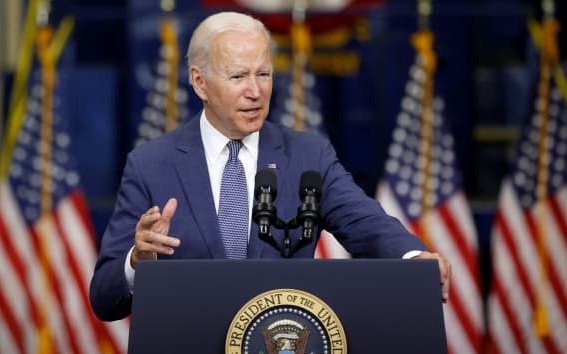President Joe Biden speaks about his infrastructure plan, Kearny, New Jersey, October 25, 2021 (Jonathan Ernst/Reuters)
UPDATE, OCT 29:
President Joe Biden presents the outline of a compromise $1.85 trillion budget for social and environmental policies.
The budget includes universal pre-kindergarten provision, support for child care costs, and $555 billion in investment to deal with climate change.
However, other programs have been stripped from the Build Back Better Act, which originally was $3.5 trillion, after the opposition of two Democratic Senators — Joe Manchin of West Virginia and Kyrsten Sinema of Arizona — as well as the obstruction of all 50 Republican senators. They include the measures for “clean energy”, removed by the objections of Manchin, who is backed by the fossil fuel industry. The West Virginian’s refusal also has doomed paid parental leave, maintaining the US as one of the few developed countries in the world that has no provision.
Meanwhile, progressive House Democrats repeated that they would not accept the final vote on the $1 trillion infrastructure bill without assurances that the $1.85 trillion budget will not be cut further.
House Speaker Nancy Pelosi delayed the floor vote on infrastructure, sought by the White House before Biden departed for Rome and then Scotland for the COP26 conference on climate change.
Manchin and Sinema are privately saying that they support the compromise, but neither will commit publicly. Rep. Cori Bush of Missouri responded that she felt “a little bamboozled” by the tactics.
Pelosi noted that highway and transit programs would expire on Sunday without an infrastructure vote: “This is professional. Let’s do it in a timely fashion and not leave doubt.”
On Thursday night, the House voted 358 to 59 for a short-term extension of the programs.
Speaking in the White House’s East Room before departing for Rome, Biden said of the “historic” budget: “No one got everything they wanted, including me. But that’s what compromise is. That’s consensus. And that’s what I ran on.”
ORIGINAL ENTRY, OCT 26: Hopes rise for a compromise on the Biden Administration’s infrastructure plan and budget for social and environmental policies.
Intensive discussions have been held for weeks for the $1 trillion infrastructure package and the budget, scaled back from $3.5 trillion, to reach the Senate floor for a vote.
On Monday, reports indicate that Sen. Joe Manchin of West Virginia, one of two Democratic holdouts in the 50-50 Senate, was moving towards acceptance of the revised budget which he demanded. If he and Sen. Kyrsten Sinema of Arizona finally drop their objections, the Democrats can pursue “budget reconciliation”, bypassing the Republican filibuster which has blocked almost all legislation.
Manchin met with Biden on Monday in Delaware. Afterwards, the President said the talks had “gone well”.
Speaking in a suburb of Newark, New Jersey, Biden told the audience, “When we make these investments, there is going to be no stopping America. We will own the future. So let’s get this done.”
Manchin, who receives significant contributions from the fossil fuel industry, objected to clean energy provisions in the original $3.5 trillion budget and to the scale of policies over child poverty, food provision, education, health care, and paid leave. He proposed a limit of $1.5 trillion for the plan.
The House passed the infrastructure package at the end of June, but Democratic progressives have objected to Senate confirmation until the budget is also agreed.
See also Biden Scales Back $3.5 Trillion Budget, with Cuts of Education and Paid Leave
Manchin is still raising objections to expanded health care benefits and the creation of the federal paid leave program. Fellow Democratic Senators are lobbying him to modify his position.
Sen. Kirsten Gillibrand of New York said on Monday night, “I can tell you Sen. Manchin is interested in an employer and employee based [plan], and I am negotiating with him right now to see if we can include paid leave in a final package/”
Sens. Raphael Warnock and Jon Ossoff, both of Georgia, are addressing Manchin over the effort to close gaps in Medicaid coverage. Warnock said Monday evening that he believes Medicaid expansion will still be included in the budget.
Sen. Elizabeth Warren of Massachusetts has been working with Sinema on proposals for revenues from the wealthy and corporations, after Biden was forced to drop the proposal for a rise in corporation tax from 21% to 28%.
Senate Finance Committee Chair Ron Wyden of Oregon said Monday that Democrats plan to introduce the “billionaires tax” in the next two days. Manchin has said he will accept that proposal:
I support basically everyone paying their fair share of taxes. We all have a different approach to that. But as far as on the taxation, I think that corporations should be paying at least a minimum if you’re doing business in the United States.
Manchin, who chairs the Energy Committee, met Monday afternoon with Senate Majority Leader Chuck Schumer and other Democratic colleagues.

